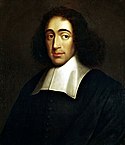Baruch Spinoza Quote
The formation of society serves not only for defensive purposes, but is also very useful, and, indeed, absolutely necessary, as rendering possible the division of labor. If men did not render mutual assistance to each other, no one would have either the skill or the time to provide for his own sustenance and preservation: for all men are not equally apt for all work, and no one would be capable of preparing all that he individually stood in need of. Strength and time, I repeat, would fail, if every one had in person to plow, to sow, to reap, to grind corn, to cook, to weave, to stitch and perform the other numerous functions required to keep life going; to say nothing of the arts and sciences which are also entirely necessary to the perfection and blessedness of human nature.
The formation of society serves not only for defensive purposes, but is also very useful, and, indeed, absolutely necessary, as rendering possible the division of labor. If men did not render mutual assistance to each other, no one would have either the skill or the time to provide for his own sustenance and preservation: for all men are not equally apt for all work, and no one would be capable of preparing all that he individually stood in need of. Strength and time, I repeat, would fail, if every one had in person to plow, to sow, to reap, to grind corn, to cook, to weave, to stitch and perform the other numerous functions required to keep life going; to say nothing of the arts and sciences which are also entirely necessary to the perfection and blessedness of human nature.
Related Quotes
Certainly we can say that the pace of modern life, increased and supported by our technology in general and our personal electronics in particular, has resulted in a short attention span and an addict...
About Baruch Spinoza
Spinoza was born in Amsterdam to a marrano family that had left Portugal for a more tolerant Amsterdam. He had a traditional education for a Jewish boy, learning Hebrew and studying the sacred texts. He was part of the wealthy Portuguese Jewish community, where his merchant immigrant father was a prominent member. As a young man, Spinoza was permanently expelled from the Jewish community for defying rabbinic authorities and disputing Jewish beliefs. After his expulsion in 1656, he did not affiliate with any religion, instead focusing on philosophical study. He had a dedicated following, or philosophical sect, who met to discuss his writings.
Spinoza challenged the divine origin of the Hebrew Bible, the nature of God, and the earthly power wielded by religious authorities, Jewish and Christian alike. He was frequently called an atheist by contemporaries, although nowhere in his work does Spinoza argue against the existence of God. This can be explained by the fact that, unlike contemporary 21st-century scholars, “when seventeenth-century readers accused Spinoza of atheism, they usually meant that he challenged doctrinal orthodoxy, particularly on moral issues, and not that he denied God’s existence." His theological studies were inseparable from his thinking on politics; he is grouped with Hobbes, John Locke, Gottfried Wilhelm Leibniz, and Immanuel Kant, who "helped establish the genre of political writing called secular theology."
Spinoza's philosophy encompasses nearly every area of philosophical discourse, including metaphysics, epistemology, political philosophy, ethics, philosophy of mind, and philosophy of science. With an enduring reputation as one of the most original and influential thinkers of the seventeenth century, Rebecca Goldstein dubbed him "the renegade Jew who gave us modernity."
